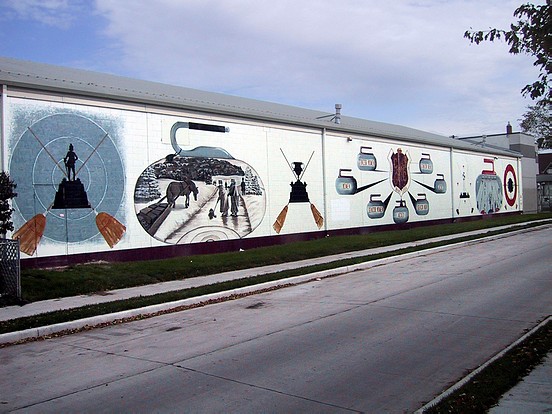|
|
|
|
|
|





|
|
300 Brazier Street
Location Map

Establishing shot.
|
Location: NW corner Brazier & Harbison; South Face
Occupant: Elmwood Curling Club
District: East Kildonan
Neighbourhood: Chalmers
Artist(s): Dorothy Streilein, Lindi Hildebrande
Year: 1997
Sponsors: Take Pride Winnipeg!, General Paint, Wyatt Rentals
|
|
|
The Elmwood Curling Club was started in the fall of 1910 when Dr. James A. McTavish,
Ed Spice and Alex Brown drove around Elmwood in a horse and buggy selling $25.00
shares to build a curling rink in Elmwood. They were able to raise enough money to
build their rink so in the early days of 1911 they were curling in a modest structure. The
Elmwood Curling Club has been at this location all that time but in 1956 the curlers got
tired of the old club and natural ice and decided to build a new facility with an artificial
ice plant. The result was the present modern curling facility that is still called Elmwood
today.
The Mural which graces the Elmwood Curling Club covers 2,100 square feet, and was
commissioned in 1997. While each of the three panels depicts a certain aspect of curling,
taken together the panels symbolize a sheet of curling ice with a house (rings) located at
either end.
The first panel (photo 2) represents the sport of curling in its infancy in Winnipeg. As
curling clubs were few, curlers frequented the rivers to play their game. After cleaning a
space on the river, the house was etched onto the river ice surface. Brooms used to
sweep the curling stones were wide straw-brooms similar to the brooms used to sweep
the floor. The wide broom was typically used from the early 1900's and well into the
1950's. The curling stones used were owned by individual curlers and were delivered to
the game-site by horse drawn sleigh. The curling stone illustration, which frames the
river scene, was typical of the style of stones first used in Winnipeg. A tassel draped
over the handle was used so that the owner could identify his own set of stones. On the
right side of the river scene, straw brooms evolved into a narrower version. The trophy
silhouette on the left depicts one of the earlier trophies presented to the Canadian ladies'
curling champions. The MacDonald Lassie trophy was presented from 1973 to 1979.
The trophy silhouette on the right depicts the first trophy presented to the Canadian
men's curling champions. The MacDonald Brier trophy was presented from 1927 to
1979.
The second panel (photo 3) depicts the types of leagues present in the sport of curling:
Junior Women, Women, Senior Women, Junior Men, Men, Senior Men and Mixed
leagues. Curling is one of the few sports for all ages. The Elmwood crest in the centre of
the panel proudly represents the curling tradition that has existed since 1911 in the
Elmwood community. The Elmwood Curling Club is the third oldest curling club in
Winnipeg.
The third panel (photo 4) represents the present state of curling. The house etched in
river ice has become a brightly coloured set of rings. The straw broom has evolved into a
push-style, which, originally made from horsehair, has now turned into a synthetic
version. The centre image depicts the ice area of the Elmwood Curling Club; five sheets
of artificial ice with young and old, male and female enjoying the game of curling. The
curling stone framing the image represents the present-day curling stone complete with
a longer coloured handle. The trophy silhouette on the left depicts the Scott Tournament
of Hearts trophy presented to the Canadian ladies' curling champions. The trophy, in
existence since 1982, is surrounded by four red Scott Hearts; symbolizing the effort,
commitment, dedication and sportsmanship that each team member brings in order to
become the Canadian ladies champion. The trophy silhouette on the right depicts the
Labatt Brier trophy presented to the Canadian men's curling champions. The trophy, in
existence since 1980, is surrounded by four purple hearts which symbolizes the effort,
commitment, dedication and sportsmanship that each team member brings in order to
become the Canadian men's champion. To date, Manitoba men and women have won
over 30 Canadian curling championships. Elmwood teams winning a Canadian curling
championship include the Dr. Bill McTavish rink (1973), the Norm Houck rink (1987) and
the Jim Ursel rink (1990).
The Mural is a bright and colourful tip-of-the-hat to the sport of Curling in our city, and
certainly beautifies the iceshed from its former drab appearance (photo 5). It became a
reality due primarily to the hard work of the 1997 Elmwood Mural committee (photo 7)
and the artists too, of course (photo 6). Bruce Huchko, who sat as Chair of that
committee, looks back on the project with a great sense of pride and accomplishment.
Source: Thanks to Bruce Huchko, who chaired the 1997 Elmwood Mural committee and
provided assistance with these comments.
Visit Elmwood Curling Club's website at:
http://www.elmwoodcurlingclub.com/
|
|